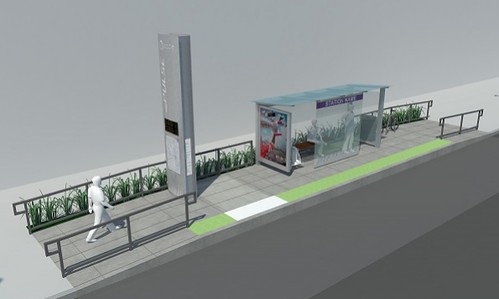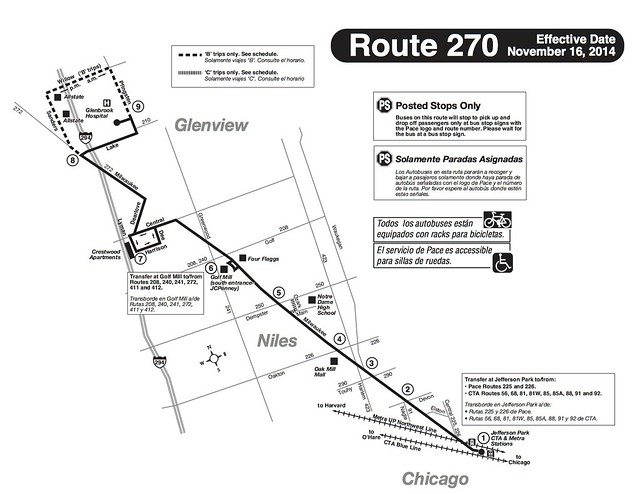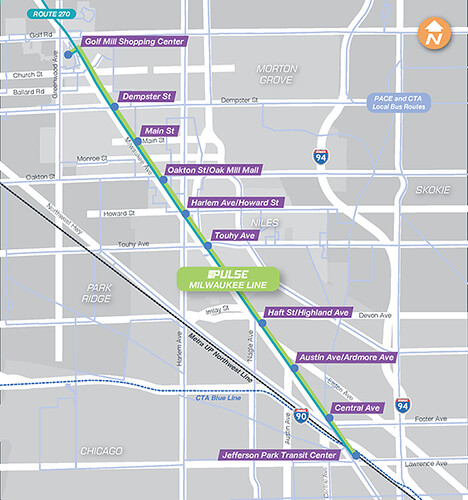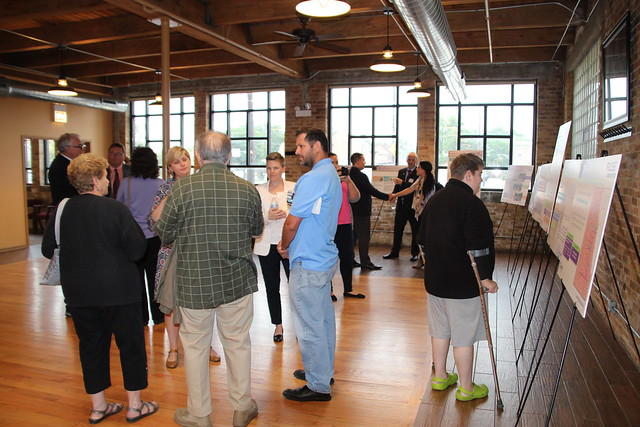If you’re a fan of faster bus service with handy amenities, here’s some news to get your pulse racing. Pace Suburban Bus Service is planning Pace Pulse, a new network of express bus routes along major roads throughout Chicagoland. The agency has proposed establishing the service, which they refer to as arterial bus rapid transit (ART), on several busy arterials, including Milwaukee Avenue, Dempster Street, Harlem Avenue, Cermak Road, Halsted Street, 95th Street, and Roosevelt Road.
Pulse, slated to launch on Milwaukee Avenue in 2017, will include roughly three-quarter of a mile stop spacing, transit signal priority, buses with WiFi and USB charging ports, plus stations with real-time arrival information signs and – best of all – overhead heat during the winter. However, it’s worth noting that the service can’t be classified as true bus rapid transit, because it will lack features like prepaid boarding and car-free bus lanes, which are necessary for bringing buses up to train-like speeds on congested streets.
The flagship Pulse route on Milwaukee Avenue will run between the Jefferson Park Transit Center on Chicago's Northwest Side and the Golf Mill Shopping Center in northwest-suburban Niles. Pace currently operates the #270 Milwaukee Avenue bus daily between Jefferson Park and Golf Mill. During select hours, the route is extended to Glenbrook Hospital in Glenview and the Allstate Insurance corporate headquarters in Northbrook.
The #270 is one of Pace's key north-suburban routes, with strong ridership. According to the Regional Transportation Authority which oversees Pace, the CTA, and Metra, the line’s ridership as of June 2015 is 2,995 boardings on weekdays, 1,966 on Saturdays and 1,418 on Sundays.
The Jefferson Park Transit Center is a major transportation hub on the Northwest Side of Chicago. It is served by the CTA Blue Line, Metra's Union Pacific / Northwest Line, nine CTA bus routes and three Pace Suburban bus lines. Golf Mill is a large shopping mall located at the intersection of Milwaukee and Golf Road. It attracts shoppers from all over the surrounding area to its department stores, specialty stores, and movie theater. Many people from Chicago’s Northwest Side ride the #270 to shop and work at the mall.
Planning for the Milwaukee Pulse route started in 2014 and is currently in the design phase. Construction is expected to begin next year, with service debuting in 2017, according to the project schedule.
The total cost of the shelters and signage is estimated at $9.1 million, while the cost of new buses, which will be used exclusively on this route, is estimated at $4.5 million. The funding is largely provided by a federal Congestion Mitigation and Air Quality grant, with a 20-percent local and regional match.
The Milwaukee ART buses will only make stops at eight locations between the mall and the transit center, including (from south to north) Central Avenue, Austin/Ardmore Avenues,Haft Street/Highland Avenue (near Devon Avenue), Touhy Avenue, Howard Street/Harlem Avenue, Oakton Street/Oak Mill Mall, Main Street, and Dempster Street. The transit signal priority feature shortens red light phases and extends greens to help prevent buses from getting stuck at intersections.
Each Pulse stop will feature a heated bus shelter with a bus tracker display with real-time arrival info, plus a vertical marker that will make it easy to spot the express stops from a distance, and bike parking racks. In addition to Wi-Fi and charging ports, the buses will feature audio/visual stop announcements.
The Milwaukee Pulse route will operate from 5 a.m. to midnight on weekdays, with buses running every ten minutes during rush hours, 15 minutes during most non-peak periods, and every 30 minutes from 10 p.m. to midnight. On weekends, it will run from 5:30 a.m. to midnight on Saturdays and 6 a.m. to midnight on Sundays, with buses every 15 minutes until 10 p.m. and every 30 minutes between 10 p.m. and midnight. The frequency of the local #270 Milwaukee buses will be reduced to every 30 minutes on weekdays and every 60 minutes on weekends. Service north of Golf Mill will remain the same.
Pace held a public meeting on the project last night at the Copernicus Center in Jefferson Park, with about 30 people in attendance. Most of the residents I talked with were in favor of the new express bus service, and said it would speed up their commutes. Garland and Heather Armstrong of Elmwood Park said Pulse will be a significant upgrade from the current #270 bus service, which they said is a lifeline for people with disabilities.
However, not everyone was a complete fan of the Pulse plan. Jacob Aronov, from the grassroots transit advocacy group Citizens Taking Action, said he’s worried about the longer headways for the local buses, and wants to make sure the local route isn’t eventually eliminated.
A majority of riders will likely opt to take the faster Pulse service, since the stops will be no more than a quarter-mile (a five-minute walk for most people) from any of the local stops. However, some seniors and people with mobility issues may prefer to continue using their closest local stop. Hopefully, riders’ concerns will be factored into the final plan.







